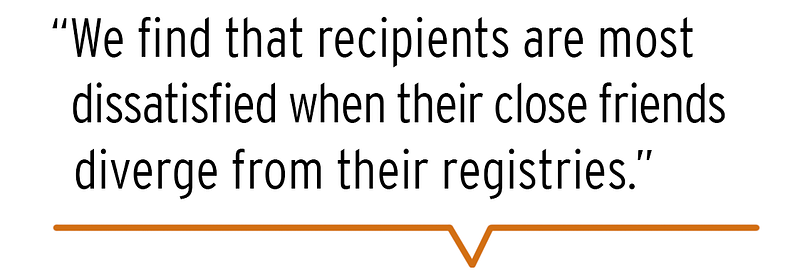Why Your Close Friends Don’t Buy You What You Want
Registries help make gift-giving easier, but research from McCombs explains why you still might not get what you asked for
By Adrienne Dawson

People create gift registries for new babies, new houses, new spouses… There’s even ManRegistry.com, for the guy who needs a personalized whiskey barrel. We create registries to make it easier for people to select gifts for us — which is to say, to make sure we get what we really want. But research shows that of all people, your friends are the least likely to pick from your registry. Especially your best friends. McCombs marketing professor Susan Broniarczyk, Susie and John L. Adams Endowed Chair of Business, explains why.
Many of us have probably had a close friend give us something we didn’t like or want, even after we went through the trouble of putting together a registry. What’s going on there?
Gift-giving is very symbiotic. When we give gifts, they serve two purposes. The first stated purpose is almost always to give someone a gift that they would like, but a second important goal is to give a gift that signals how someone values that relationship. Registries really put those two in conflict.

How so?
We assign a lot to gift-giving. We tell ourselves we want to get our friends exactly what they want, but we also feel we’re not signaling how well we know the other person if we can’t select the gift ourselves. On a certain level, a registry cuts through some of that social angst because a person can say, “Hey, this is explicitly what I want.” That part’s a slam-dunk. The problem is how it achieves the second objective of relationship signaling.
You arranged a series of experiments with test subjects who were close friends and others who were more distant acquaintances to try to understand how this works. What did you find?
We find that when close friends choose gifts for each other, they’re more likely to diverge from a registry, but it’s not because they’re being altruistic or trying to look for a better gift. They’re using it as an opportunity to show the person how well they know them, what we call relationship signaling. In contrast, distant friends do not feel the second goal of relationship signaling as acutely. Consequently, distant givers are more likely to give recipients the items they explicitly requested on the registry, thereby ironically leading recipients to be more satisfied with gifts from distant than close friends.
Does it matter what kind of registry it is?
To a point, yes, although this pattern holds across all types. For a wedding registry, for example, we find that close friends diverge about a third of the time — more than double the rate for distant friends. For something like a housewarming registry, however, close friends diverge almost 50 percent of the time, compared to only 25 percent for distant friends. But this is only the case when the gift-giver gets attribution.
What happens when a gift-giver remains anonymous, like in a Secret Santa situation?
In this case, close friends pretty much stuck to the registry, which confirms for us that it isn’t that they think they choose better gifts, it’s simply that they want to signal relationship value. If the recipient won’t know who the giver is, there’s no need to signal anything, and gift-givers focus on selecting something the person has explicitly requested and will definitely like.
Other researchers have suggested that people shop off-registry because on some level, they’re shopping for themselves, like a 6-year-old choosing a LEGO set for Mother’s Day. Is that what you find?
No, it’s not. We very precisely set up the gift options to test for that because we wanted to know if people’s gift selections were projections of their own tastes or preferences.
We let people classify gifts into three buckets.
- Gifts that match what’s on the registry.
- Gifts they think the recipient would like, but which are not on the registry.
- Items we know the giver will like best, based on initial tests participants took.
We find very little evidence of people projecting, especially for close friends.
Are people aware of this internal gift-giving conflict?
No, it’s not something we’re conscious of, and we can see that when we study what items test subjects look at when they’re just browsing versus when they’re actually engaged in a purchase. Browsing doesn’t create a goal conflict. It’s the actual purchase that forces people to decide on some level, “Oh, I can’t really signal the relationship with that registry item, so I’m going to diverge and choose a different gift.”
If you think about it, really, within the context of our studies, it’s fascinating that people explicitly go against what their friends want. In fact, we find that recipients are most dissatisfied when their close friends diverge from their registries. The giver is trying to signal that they have a close relationship and know something about this person, but they’re also simultaneously ignoring or disregarding what the friend has selected.
What can marketers learn from this?
There are a number of things. One is that retailers might work on how registry gifts are packaged to allow people to express this relational signal. For instance, it’s an opportunity for retailers to cross-sell items and increase the amount of the purchase by saying, “Buy this registry item, and here’s another small item that complements it and allows you to personalize your gift.” That way you’re still giving your friend what they want, and you’re also giving them something extra that helps you signal that relationship.
Another thing we see is that people tend to put functional items on registries. This could be an opportunity for retailers to coach gift recipients to make sure they’re adding some personal items on their registries. That would allow people to feel like they can choose a gift that satisfies both motives simultaneously.
And always be sure to include a gift receipt, no matter what?
Exactly.
Ask and You Shall (Not) Receive: Close Friends Prioritize Relational Signaling Over Recipient Preferences in Their Gift Choices was published in the Journal of Marketing Research in 2016 with co-author Morgan Ward from Emory University.
Originally published at www.texasenterprise.utexas.edu on May 30, 2017.
About this Post
Share:


